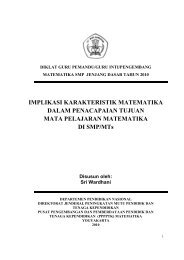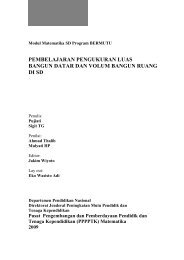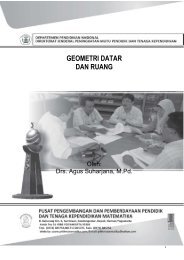25 Biggest Mistakes Teachers Make and How to Avoid Them
25 Biggest Mistakes Teachers Make and How to Avoid Them
25 Biggest Mistakes Teachers Make and How to Avoid Them
You also want an ePaper? Increase the reach of your titles
YUMPU automatically turns print PDFs into web optimized ePapers that Google loves.
Mistake 20: Teacher Misjudgment<br />
mortified. I do recall looking at my<br />
teacher, imploring her <strong>to</strong> intervene,<br />
but she did nothing but look away. I<br />
do not think she ever <strong>to</strong>ok responsibility<br />
for letting us go. She certainly<br />
never apologized <strong>to</strong> us for setting us<br />
up for trouble. Fortunately, we were<br />
not suspended. I did learn years later<br />
that the seemingly innocent “c<strong>and</strong>y<br />
157<br />
shop” was really a front for drug<br />
dealers who sold drugs <strong>to</strong> kids. As I<br />
reflect back on my experience, I see<br />
the importance of rules <strong>and</strong> policies<br />
that are designed <strong>to</strong> safeguard children.<br />
<strong>Teachers</strong> should not knowingly<br />
violate school policy no matter<br />
how well intentioned the situation<br />
might be.<br />
SCENARIO 20.4<br />
The Whole Is Greater Than Its Parts<br />
Mrs. W. called me up in front of the class <strong>to</strong> reprim<strong>and</strong> me for a 68 in spelling on a<br />
scholastic achievement test, when I had made a 99 cumulative score overall.<br />
A classic mistake that teachers<br />
<strong>and</strong> parents make is focusing<br />
on the negative <strong>and</strong> effectively discounting<br />
the positive. In this scenario,<br />
the teacher virtually ignored the high<br />
cumulative score <strong>and</strong> zeroed in on the<br />
low spelling score. The public reprim<strong>and</strong><br />
was perceived as a punishment.<br />
The high cumulative achievement<br />
was neither recognized nor rewarded.<br />
This is confusing for the student. It is<br />
not clear if the student was a success<br />
or a failure at the task.<br />
Savvy teachers know that if they<br />
feel they must criticize some aspect<br />
SCENARIO 20.5<br />
Excluded!<br />
of a student’s performance, it should<br />
certainly be put in proper perspective.<br />
In this scenario where the child<br />
was weak in spelling but overall did<br />
an excellent job, a word of encouragement<br />
<strong>to</strong> improve in spelling <strong>and</strong><br />
a jubilant focus on the overall accomplishment<br />
would be appropriate.<br />
Weiner (1979) proposes that we help<br />
students <strong>to</strong> properly attribute their<br />
successes <strong>and</strong> failures <strong>to</strong> their ability<br />
<strong>and</strong> effort. If a child is confused<br />
about his or her successes <strong>and</strong> failures,<br />
he or she may never learn <strong>to</strong><br />
attribute appropriately.<br />
In my sixth-grade drama class after the script was written <strong>and</strong> h<strong>and</strong>ed out <strong>to</strong> the students,<br />
I looked on the character listing <strong>and</strong> I wasn’t even in the script! She had <strong>to</strong> write me in.<br />
Sometimes teachers make<br />
honest mistakes that can be<br />
perceived as having malicious intent.<br />
In this scenario, the author obviously<br />
believed that the teacher had an ulterior<br />
motive in writing her out of the<br />
script. Although the teacher wrote<br />
her back in, the student was unable





